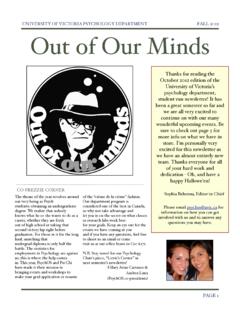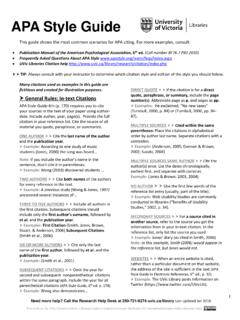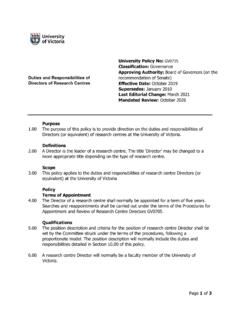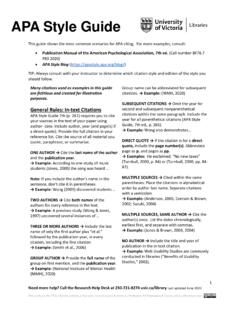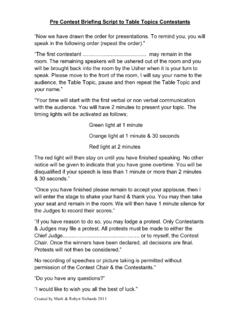Transcription of PSYCHOLOGY 365 (A01) INTRODUCTION TO CLINICAL PSYCHOLOGY ...
1 PSYCHOLOGY 365 / INTRODUCTION to CLINICAL PSYCHOLOGY / spring 2018 Course Outline / Page 1 of 5. PSYCHOLOGY 365 (A01) INTRODUCTION TO CLINICAL PSYCHOLOGY spring 2018, CRN 22610 Instructor: Dr. Marion F. Ehrenberg Office: Cornett A192 / Telephone: (250) 721-8771 Electronic Mail: Teaching Assistant: Kari Duerksen, Office hours TBA; held after tests Meeting Time & Place: Mondays & Thursdays, 8:30-9:50, ECS 125 Office Hours: Mondays 1:00-2:00 or by appointment Course Website: PSYC 365 CourseSpaces, Course Description: Welcome to PSYCHOLOGY 365! Grounded in relevant theory and research, this course offers an INTRODUCTION to the field of CLINICAL PSYCHOLOGY . This course surveys the major areas of CLINICAL PSYCHOLOGY including ethics, diagnosis, assessment, prevention, and intervention.
2 We will examine the history and evolution of CLINICAL PSYCHOLOGY , the professional activities of CLINICAL psychologists, the research basis for CLINICAL practice ( , evidence-based practice), and current issues and emerging trends in the field. Subspecialties within the discipline, including neuropsychology and forensics, will be discussed. The course will also identify and describe other professionals involved in mental health practice, including psychiatrists and social workers, and their roles in relation to CLINICAL psychologists. Learning Objectives: By the end of this course students should be able to: 1. Understand the training and types of activities of CLINICAL psychologists 2. Identify and describe the key ethical principles central to CLINICAL psychologists PSYCHOLOGY 365 / INTRODUCTION to CLINICAL PSYCHOLOGY / spring 2018 Course Outline / Page 2 of 5.
3 3. Understand the principles, the strengths and the liabilities, of diagnosis and classification systems 4. Understand and describe the basic forms of CLINICAL assessment and interventions along with their empirical bases 5. Appreciate and identify emerging trends and specializations in CLINICAL PSYCHOLOGY and their relations with ever-developing societal needs 6. Understand the roles of other professionals involved in mental health care and how they might interact with CLINICAL psychologists to the benefit of the public Course Evaluation: Grades will be based on four tests. These tests are non-cumulative and will be primarily multiple-choice and may include some short answer questions. Exams will be based on material covered in the course texts and seminars. Power point slides outlining the lecture portion of each of the classes will be posted on CourseSpaces; however, learning attributable to group exercises and the details of lectures can only be derived from attending the class.
4 Students may wish to identify a "class partner" early in the term from whom they may be able to obtain class notes for occasionally missed classes. Test Date Percentage Contribution to Final Grade 1 January 22 25% 2 February 8 30% 3 March 12 30% 4 April 5 15% As per university policy, your final grade in the course will be based on your total percent score. Grades that end with a decimal point of or above will be rounded to the next higher whole number, and grades that end with a decimal point below will be rounded to the next lower whole number. A+ 90-100% B+ 77-79% C+ 65-69% A 85-89% B 73-76% C 60-64% A- 80-84% B- 70-72% D 50-59% F 0-49% Make-up Exams, Withdrawals & Prerequisites: It is the student's responsibility to attend tests as scheduled. Students who miss an in-class test will receive a mark of zero unless they have a case of documented illness or family emergency.
5 In such circumstances, you should notify the instructor immediately by email, and you must present a medical certificate as soon as possible so that arrangements can be made for a make-up exam according to the department's make-up examination schedule. Make-up exams or deadline extensions will not normally be given for reasons other than those specified above. PSYCHOLOGY 365 / INTRODUCTION to CLINICAL PSYCHOLOGY / spring 2018 Course Outline / Page 3 of 5. Please refer to the current University calendar for the formal policy on make-up examinations, as well as the dates and deadlines for enrolling and withdrawing from this course. The last day for adding courses that begin in the second term is Friday, January 19, 2018, and the last day for withdrawing from 2nd term courses without penalty of academic failure is Wednesday, February 28, 2018.
6 Students who remain in courses for which they do not have the prerequisites do so at their own risk and are not exempt from having to complete the prerequisite course(s) at some later date if such courses are required for their degree program. Prerequisites for PSYC 365 include: PSYC 201 and PSYC 260. Important Note on Classroom Environment: Please note that the University of Victoria and this course instructor are committed to promoting, providing, and protecting a positive, supportive and safe learning environment for all its members, including the students enrolled in this class. Course Text: The course text is available in the U Vic Bookstore and a digital version is also available: Lee, , & Hunsley, J. (2018). INTRODUCTION to CLINICAL PSYCHOLOGY : An evidence-based approach (4th edition).
7 Hoboken, NJ: John Wiley & Sons. Understandably, students often wonder whether a previous version of the same text is an acceptable alternative to the current 4th edition. Unfortunately, a previous version is not an acceptable alternative, particularly because CLINICAL PSYCHOLOGY is a rapidly developing field and the new 4th edition reflects this progress. Students may wish to make arrangements to share a text with another class member in order to reduce costs, but such arrangements are solely the responsibility of the students and cannot be initiated or managed by the instructor or teaching assistant. In developing lectures and group exercises, the instructor will assume that students have completed all of the required reading assigned for specific lecture dates before attending the relevant class.
8 Attached is a table identifying the topics to be covered, required readings, and a schedule of tests in the context of course material. Again, please note that the tests are not cumulative. Therefore, each test will cover the material lecture, class exercises, chapter readings up to and including the class that falls just before the date of the test and, for tests 2, 3, 4, the material that was covered since the writing of the previous test. PSYCHOLOGY 365 / INTRODUCTION to CLINICAL PSYCHOLOGY / spring 2018 Course Outline / Page 4 of 5. Week Dates Topic Chapter Readings Test Schedule 1 Th, Jan 4 Course Orientation 2 M, Jan 8 Th, Jan 11 CLINICAL PSYCHOLOGY in Historical Perspective Related MH Professional: The Psychiatrist 1 3 M, Jan 15 Th, Jan 18 CLINICAL PSYCHOLOGY Today: Activities, Training & Licensure 2 4 M, Jan 22 Th, Jan 25 Test 1 Benefits & Liabilities of Classification & Diagnosis 3 Test 1: Jan 22 5 M, Jan 29 Th, Feb 1 Research Methods & the Scientist-Practitioner Model of CLINICAL PSYCHOLOGY 4 6 M, Feb 5 Th, Feb 8 Psychological Assessment: An Overview Test 2 5 Test 2: Feb 8 7 M, Feb 12- F, Feb 16 No Classes Reading Break 8 M, Feb 19 Th, Feb 22 Psychological Assessment: Interviewing, Observation & Self-Report Questionnaires 6 & 8 9 M, Feb 26 Th, Mar 1 Psychological Assessment: Intellectual & Cognitive Measures Related Professional.
9 The Psychometrist 7 10 M, Mar 5 Th, Mar 8 Psychological Assessment: Integration, CLINICAL Decisions, & Recommendations Intervention: Overview 9 & 11 11 M, Mar 12 Th, Mar 15 Test 3 Intervention: Adults, Couples, Children & Adolescents Related MH Professional: Child & Youth Care Worker Focus on Chapter 12 or 13** (see note below) Test 3: Mar 12 12 M, Mar 19 Th, Mar 22 Intervention Research Prevention Related Professional: The Counselling Psychologist & Other Types of Counsellors 14 10 13 M, Mar 26 Th, Mar 29 Subspecialties of CLINICAL PSYCHOLOGY : Health, Neuropsychology, Forensics Related MH Professional: The Medical Social Worker 15 14 M, Apr 2 Th, Apr 5 Easter Monday No Class Test 4 Test 4: Apr 5 PSYCHOLOGY 365 / INTRODUCTION to CLINICAL PSYCHOLOGY / spring 2018 Course Outline / Page 5 of 5. **The instructor will provide an overview of interventions for adults, couples, children and adolescents.
10 On Test 4 students will be responsible for all lecture material, but can then choose to answer questions based on Chapter 12 (Adults & Couples) OR 13 (Children & Adolescents), which will be clearly identified to the test-taker. This modification will allow students to focus on their own interests and hopefully prevent material overload for Test 4. Nevertheless, for optimal learning it is recommended that students read over both chapters 12 and 13. I hope you enjoy the course! UNIVERSITY OF VICTORIA Department of PSYCHOLOGY Important Course Policy Information Winter 2017-2018 Prerequisites Students who remain in courses for which the y do not have the prerequisites do so at their own risk. Students who complete courses without prerequisites ARE NOT exempt from having to complete the prerequisite course(s) if such courses are required for the degree program.
